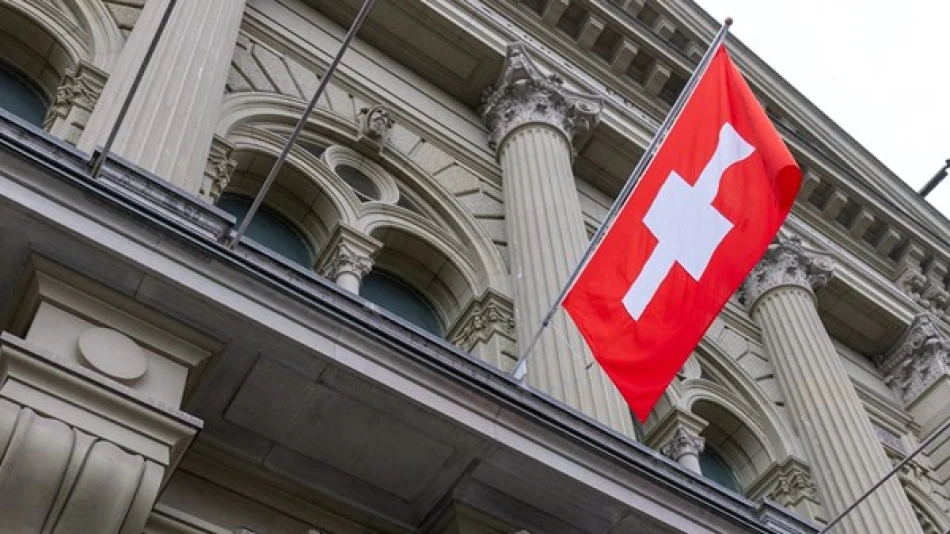
Switzerland Open to Reviewing US Tariff Offer, Seeking Trade Equilibrium
Switzerland Faces Economic Crisis as Trump Imposes 39% Tariffs on Key Exports
Switzerland is scrambling to avoid a potential recession after President Donald Trump imposed devastating 39% tariffs on Swiss exports, targeting one of Europe's most trade-dependent economies. With tens of thousands of jobs at risk and economic growth projected to plummet by up to 0.6%, Swiss officials are preparing emergency measures and considering major concessions to reverse what economists warn could be the country's most serious trade crisis in decades.
Emergency Cabinet Meeting as August Deadline Looms
Swiss Business Minister Guy Parmelin announced the government's willingness to revise its offer to the United States as the August 7 implementation date approaches rapidly. The Swiss Federal Council will convene a special emergency session on Monday to chart the country's response strategy.
"We need to understand exactly what happened and why the American president made this decision," Parmelin told Swiss Broadcasting Corporation. "The timeframe is short and it may be difficult to achieve something by August 7, but we will do everything we can to show good faith and review our offer."
Trade Deficit at Heart of Dispute
The tariffs appear directly linked to America's substantial trade deficit with Switzerland, which reached 38.5 billion Swiss francs ($48 billion) last year. This imbalance reflects Switzerland's dominance in high-value exports including pharmaceuticals, luxury watches, and precision machinery—sectors that now face potential devastation in their largest overseas market.
Switzerland's Desperate Bargaining Chips
Facing economic catastrophe, Swiss officials are exploring multiple concessions to appease the Trump administration. The government is considering purchasing American liquefied natural gas, despite Switzerland's limited energy infrastructure for such imports. More significantly, officials are discussing increased Swiss corporate investment in the United States.
These potential deals highlight Switzerland's vulnerable position as a small, export-dependent economy facing off against the world's largest market. Unlike larger economies such as Germany or China, Switzerland lacks the economic leverage to engage in a prolonged trade war.
Comparison to Past Trade Conflicts
The 39% tariff rate places Switzerland among the highest-targeted countries in recent U.S. trade policy, comparable to peak tariffs imposed on Chinese goods during the previous trade war. However, Switzerland's situation differs markedly—the country has traditionally maintained excellent relations with Washington and lacks China's massive domestic market to cushion export losses.
Economic Devastation Looms for Export-Dependent Economy
Hans Gersbach, an economist at ETH Zurich, projects Swiss economic growth could contract by 0.3% to 0.6% under the 39% tariff regime. If pharmaceuticals—currently exempted—become included, the damage could exceed 0.7% growth reduction.
"A recession could occur," Gersbach warned, noting that prolonged disruptions might shrink Switzerland's GDP by more than 1%.
Industrial Sectors Face Existential Threat
Swiss industrial associations have sounded alarms about tens of thousands of jobs at risk, particularly in the country's signature industries. The luxury watch sector, already facing challenges from smartwatch competition, could see American sales—a crucial market segment—collapse overnight.
Switzerland's pharmaceutical giants, including Roche and Novartis, face potential supply chain disruptions that could affect global drug distribution. The precision machinery sector, backbone of Swiss manufacturing, confronts the loss of its most profitable export destination.
Limited Options for Retaliation
Unlike the European Union's coordinated response capabilities, Switzerland's bilateral approach leaves it isolated in trade negotiations. The country cannot leverage collective European bargaining power while maintaining its traditional neutrality and independence from EU trade policy.
Swiss officials have notably avoided threatening retaliatory measures, instead focusing entirely on diplomatic solutions and economic concessions. This approach reflects both Switzerland's limited retaliatory capacity and its historical preference for negotiated settlements over confrontation.
The crisis tests Switzerland's long-standing strategy of maintaining economic prosperity through trade relationships while avoiding political entanglements. As the August deadline approaches, the country faces a stark choice between economic capitulation and potential recession—a dilemma that could reshape Swiss foreign economic policy for years to come.
Most Viewed News

 Layla Al Mansoori
Layla Al Mansoori






